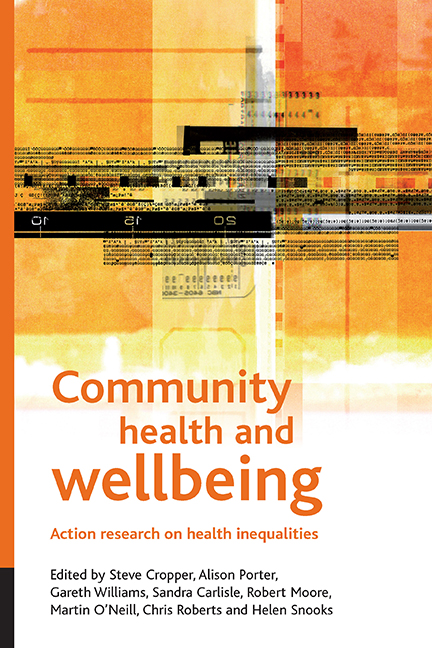Book contents
- Frontmatter
- Contents
- List of tables and figures
- Preface
- Acknowledgements
- Notes on contributors
- one Health inequalities in their place
- two ‘Policy experiments’: policy making, implementation and learning
- three Policy innovation to tackle health inequalities
- four Action research partnerships: contributing to evidence and intelligent change
- five Engaging with communities
- six The role of the community-based action researcher
- seven Evaluation, evidence and learning in community-based action research
- eight Social theory, social policy and sustainable communities
- nine Beyond the experimenting society
- Index
- SHARP DVD: A Way of Working Together to Improve Our Lives
one - Health inequalities in their place
Published online by Cambridge University Press: 15 September 2022
- Frontmatter
- Contents
- List of tables and figures
- Preface
- Acknowledgements
- Notes on contributors
- one Health inequalities in their place
- two ‘Policy experiments’: policy making, implementation and learning
- three Policy innovation to tackle health inequalities
- four Action research partnerships: contributing to evidence and intelligent change
- five Engaging with communities
- six The role of the community-based action researcher
- seven Evaluation, evidence and learning in community-based action research
- eight Social theory, social policy and sustainable communities
- nine Beyond the experimenting society
- Index
- SHARP DVD: A Way of Working Together to Improve Our Lives
Summary
Introduction
A great deal has changed since the publication of Sir Douglas Black's ground-breaking report on inequalities in health (DHSS, 1980). In response to an article published in the now defunct New Society magazine (Wilkinson, 1976), the report was commissioned by the Secretary of State for Health and Social Services in 1977, during the dying days of James Callaghan's Labour government, in an economic environment characterised by deep cuts in public expenditure, sharply rising unemployment and growing industrial unrest. The Black Report finally entered the public domain in the bright light of a new Conservative dawn in British politics. ‘Published’ over a Bank Holiday weekend in 1980 in the form of 260 photocopies, the report would have disappeared from view had it not been for the tenacity of the report's authors, and the support of activists within the public health movement. Later published as a Penguin paperback (Townsend et al, 1988), alongside an important update from the Health Education Council (Whitehead, 1987), the Black Report was initially disseminated by being passed among friends and sympathisers, in the manner of Mikhail Bulgakov's The Master and Margarita and other post-Stalin, Soviet-bloc samizdat literature.
The class conflict, ideological divisions and social polarisation that characterised British society throughout the 1980s made it difficult to conduct any reasoned discussion of the nature of the evidence and arguments contained in the Black Report (Macintyre, 1997). The Black Report itself had been very firm in its view that health inequalities existed, and that structural or material factors provided the best explanation of them. Subsequent arguments became entrenched in debates over whether or not health inequalities really did exist and, if they did, whether it was because less healthy people were more likely to become poor, or because of patterns of individual behaviour in different socioeconomic groups, or something – social structure, or material conditions – over which individual people had little if no control (Bloor et al, 1987; Vågerö and Illsley, 1995). The cross-sectional nature of much of the data on which the Black Report was based made it difficult to resolve some of these disagreements.
- Type
- Chapter
- Information
- Community Health and WellbeingAction Research on Health Inequalities, pp. 1 - 22Publisher: Bristol University PressPrint publication year: 2007



